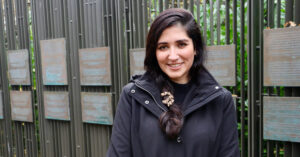One month ago, I met with Human Rights Defenders (HRDs) from Ukraine: Anastasia Moskvychova, Andrey Zaritsky, Anna Medvedeva, Hanna Sokolova, Iryna Korshunova, Mariya Yasenovska, Mykhaylo Zubkov, Natalia Shybayeva, Olena Shevchenko, Svitlana Blahodeteleva-Vovk, Marta Chumalo, Olha Matyushyna, Sophia Lapina, and two other HRDs whose names cannot be disclosed for safety reasons.
I heard from a diverse range of Human Rights Defenders, who shared common challenges in carrying out their work.
The individuals that I spoke to defend the rights of women, children, LGBTQ people, civil society activists, people residing in civil-military administrations and internally displaced persons. I heard from those defending environmental rights and those fighting against discrimination, corruption and plagiarism.
I listened with great concern as they told me about the severe risks that they face. They said that they are targeted by threats and physical attacks, against themselves, their colleagues, their offices and their homes. Most of such risks are perpetrated by non-state actors, including far-right groups or those engaged in criminal activity and corruption. I was particularly concerned by allegations that many of these crimes were met with impunity; Attackers reportedly acted on the assumption that the police would not follow up on complaints.
In cases that are ultimately investigated, I was concerned by the defenders’ reports that police are reluctant to open criminal cases. When approached about death threats, some defenders were told to “just keep a low profile.” I was disturbed to hear how the defenders described the general attitude of police towards their work. They said police who are supposed to facilitate assemblies instead sometimes arbitrarily arrest participants or mock them and use obscene language against them. The defenders say that complaints to the prosecutor’s office have for the most part not received appropriate responses.
Online spaces seem to be particularly perilous for the defenders. Far-right Telegram channels expose the identities of LGBTQ defenders, bloggers, and researchers. This can be followed by hateful and discriminatory comments by channel subscribers. I heard how in some cases, conservative activists reveal detailed private information about LGBTQ defenders, including their addresses and the names of their parents. This leads many to live in fear for the physical wellbeing. As I hear so often, Women Human Rights Defenders were particularly susceptible to smear campaigns and online bullying.
The defenders also expressed their concern at alleged attempts by the national parliament to impose further restrictions on their human rights work. They told me that there is not enough public awareness about the importance of Human Rights Defenders’ role in society.
I was so impressed by the resilience of the defenders I spoke to, who, despite the challenges they faced, offered messages of hope. While the attacks against them were aimed at sewing doubt and suspicion about their work, this was something that motivated them, and brought them closer together.
I hope to continue to receive information from Human Rights Defenders in Ukraine, in order to deepen relationships with Human Rights Defenders there and follow up on their complaints.



